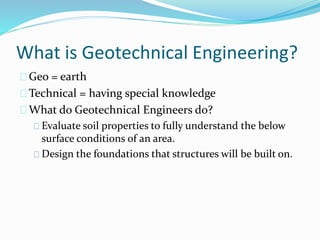Some Known Factual Statements About Geotheta
Some Known Factual Statements About Geotheta
Blog Article
The smart Trick of Geotheta That Nobody is Discussing
Table of ContentsGeotheta Things To Know Before You Get ThisFascination About GeothetaSome Known Questions About Geotheta.Excitement About GeothetaThe Facts About Geotheta Uncovered

They perform site examinations, accumulate samples, carry out research laboratory tests, and assess information to evaluate the viability of the ground for building projects - Engineer of Record. Based on their searchings for, geotechnical engineers provide suggestions for structure design, slope security, preserving structures, and reduction of geotechnical risks. They work together with other experts, such as engineers, architectural designers, and building and construction groups, to make sure that geotechnical considerations are incorporated right into the overall task layout and implementation
By assessing the habits and residential properties of soil and rock, they can identify potential geotechnical threats such as landslides, soil negotiation, or incline instability. Their knowledge assists avoid failings or accidents that might jeopardize lives and residential or commercial property. Below are some detailed duties and obligations of a geotechnical engineer: Website Examination: Geotechnical engineers conduct site investigations to collect data on subsurface problems.
They translate the data to recognize the buildings and behavior of the soil and rock, including their stamina, leaks in the structure, compaction features, and groundwater problems. Geotechnical Evaluation and Design: Geotechnical engineers analyze the information gathered throughout website examinations to examine the security and suitability of the site for construction jobs. They carry out geotechnical calculations and modeling to evaluate factors such as bearing capacity, negotiation, slope security, side earth pressures, and groundwater flow.
Some Ideas on Geotheta You Need To Know
Foundation Style: Geotechnical engineers play a critical duty in making foundations that can securely support the designated framework. They examine the soil conditions and load needs to determine the suitable structure kind, such as superficial foundations (e.g., grounds), deep foundations (e.g (https://www.avitop.com/cs/members/geotheta.aspx)., stacks), or specialized strategies like dirt renovation. They consider elements such as negotiation limitations, birthing capacity, and soil-structure interaction to create optimal foundation designs
They examine construction plans, monitor website activities, and conduct field inspections to verify that the style suggestions are complied with. If unforeseen geotechnical problems develop, they evaluate the situation and supply suggestions for removal or changes to the layout. Threat Evaluation and Mitigation: Geotechnical engineers examine geotechnical threats and risks linked with the project website, such as landslides, liquefaction, or dirt disintegration.

Cooperation and Communication: Geotechnical designers work very closely with other experts associated with a job, such as engineers, structural designers, and building and construction teams. Effective communication and cooperation are vital to incorporate geotechnical factors to consider into the total project design and building and construction procedure. Geotechnical designers give technical competence, response inquiries, and make certain that geotechnical demands are satisfied.
Geotheta - An Overview
Right here are some kinds of geotechnical engineers: Foundation Engineer: Foundation engineers specialize in developing and evaluating foundations for structures. They evaluate the dirt problems, load demands, and site attributes to establish one of the most proper foundation type and layout, such as superficial foundations, deep structures, or specialized strategies like stack foundations.
They evaluate the elements influencing slope security, such as dirt buildings, groundwater problems, and slope geometry, and create strategies to avoid slope failings and alleviate risks. Quake Engineer: Quake engineers concentrate on examining and designing structures to hold up against seismic forces. They analyze the seismic threat of a site, assess soil liquefaction capacity, and create seismic layout criteria to ensure the safety and security and resilience of frameworks throughout earthquakes.
They do field screening, accumulate examples, and assess the gathered information to characterize the soil buildings, geologic formations, and groundwater problems at a site. Geotechnical Instrumentation Engineer: Geotechnical instrumentation designers concentrate on tracking and measuring the actions of dirt, rock, and structures. They install and keep instrumentation systems that keep an eye on aspects such as soil settlement, groundwater levels, incline motions, and architectural displacements to evaluate performance and offer very early cautions of prospective concerns.
What Does Geotheta Do?
They conduct tests such as triaxial tests, loan consolidation examinations, straight shear tests, and permeability tests to gather information for geotechnical analysis and layout. Geosynthetics Engineer: Geosynthetics engineers concentrate on the layout and application of geosynthetic products, such as geotextiles, geogrids, and geomembranes. They utilize these materials to boost dirt stability, enhance inclines, provide drain services, and control erosion.
They tend to be investigatory individuals, which indicates they're intellectual, introspective, and inquisitive. They are interested, systematic, rational, logical, and logical. Some of them are additionally social, indicating they're kind, charitable, cooperative, client, caring, practical, empathetic, skillful, and pleasant - Consulting Engineer.
In the office atmosphere, geotechnical engineers make use of specialized software program tools to do calculations, create layouts, and evaluate information. They prepare reports, review task specs, interact with customers and staff member, and coordinate task activities. The office setup offers a favorable setting for research, analysis, and cooperation with various other professionals associated with the job.
Not known Incorrect Statements About Geotheta
They often check out project websites to carry out site investigations, evaluate geotechnical conditions, and collect data for analysis. These gos to include traveling to different places, often in remote or tough surfaces. Geotechnical designers might perform dirt sampling, conduct examinations, and screen building and construction activities to guarantee that the geotechnical elements of the go task are being executed appropriately.
Geotechnical engineers likewise work in specialized geotechnical research laboratories. In these centers, they perform experiments, perform tests on soil and rock examples, and assess the design residential properties of the materials. Geotechnical laboratory engineers function thoroughly in these environments, managing screening devices, operating tools, and tape-recording data. They team up with other lab staff to guarantee accurate and reliable testing outcomes.
Report this page